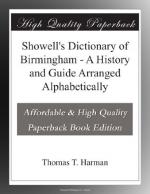1846, Aug. 25 to 28. President, Lord Wrottesley. This is known as “The Elijah Festival,” from the production of Mendelssohn’s chef d’oeuvre the “Elijah” oratorio. The performers were mostly those who had been here before, save Miss Bassano, the Misses Williams, Mr. Lockey, and Herr Joseph Staudigl. Receipts, L11,638; profits, L5,508.
1849, Sept. 4 to 7. President, Lord Guernsey. This Festival is especially noteworthy as being the first conducted by Sir Michael Costa, also for the number of “principals” who had not previously taken part in the Festivals, for the extreme length of the evening programmes, each lasting till after midnight; and, lastly, from the fact, that out of a body of 130 instrumentalists, only eight or nine Birmingham musicians could be found to please the maestro’s taste. The oratorios of the “Messiah,” “Elijah,” and “Israel in Egypt,” were the principal pieces, with Mendelssohn’s “First Walpurgis Night,” and Prince Albert’s “L’Invocazione dell’ Armonia;” the remainder being of the most varied character. The first appearances included Madame Sontag, Madame Castellan, Miss Catherine Hayes, Mdlle. Alboni, Miss Stevens (afterwards Mrs. Hale), Mdlle. Jetty de Treffz, Sims Reeves, Herr Pischek (baritone basso), Signor Bottesini (double bass), M. Sigismund Thalberg (pianist), M. Prospere Sainton (violinist), &c. Receipts L10,334; profits, L2,448.
1852, Sept. 7 to 10. President, Lord Leigh. Handel’s oratorio, “Samson,” and Mendelssohn’s unfinished “Christus,” were the chief new works; and the principal stangers were Madame Viardot-Garda, Miss Dolby, Signor Tamberlik, Herr Formes, Signor Belletti, Mr. Weiss, Signor Piatti (violoncello), Signer Bottisini (double bass), and Herr Kuhe (pianoforte) Receipts L11,925; profits L4,704.
1855, Aug. 28 to 31. President, Lord Willoughby de Broke, The programme included Costa’s “Eli” (composed for the occasion), Beethoven’s “Mount of Olives,” Glover’s “Tam O’Shanter,” Macfarren’s cantata “Lenora,” and Mozart’s “Requiem;” the fresh artistes being Madame Rudersdorf, Signor Gardoni, and Herr Reichardt. Receipts L12,745; profits, L3,108, in addition to L1,000 spent on decorating, &c., the Hall and organ.
1858, Aug. 31 to Sept. 3. President, the Earl of Dartmouth. The novelties included Mendelssohn’s Hymn “Praise Jehovah,” Beethoven’s “Mass in C.” Leslie’s Cantata “Judith,” Mendelssohn’s Cantata “To the Sons of Art,” Costa’s serenata “The Dream,” &c. First appearances were made by Mdlle. Victorie Balfe, Signor Ronconi, Mr. Montem Smith, about a dozen instrumentalists belonging to the Festival Choral Society, and nearly seventy members of the Amateur Harmonic Association, Mr. W.C. Stockley filling the post of general chorus-master. This was the last year of the “Festival Balls.” Receipts, L11,141; profits, L2,731.
1861, Aug. 27 to 30. President, the Earl of Shrewsbury and Talbot. The new introductions comprised Mdlle. Titiens, Mdlle. Adelina Patti, Mdlle. Lemmens-Sherrington, Miss Palmer, Signor Giuglini, Mr. Santley, and Miss Arabella Goddard. Beethoven’s “Mass in D,” and Hummel’s Motett “Alma Virgo” were part of the programme, which included not only the “Messiah” and “Elijah,” but also “Samson” and “The Creation,” &c. Receipts, L11,453; profits, L3,043.




